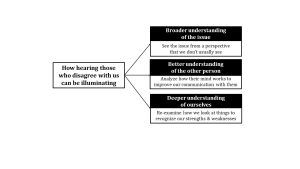 When someone disagrees with us, especially on an issue that is important to us, we may feel threatened. Consequently, we may hear them primarily to refute, not to understand, But such a narrowly-driven vision can blind us to the bigger picture that may emerge from the disagreement. Pertinently, the Bhagavad-gita (16.02) urges us to be averse to fault-finding.
When someone disagrees with us, especially on an issue that is important to us, we may feel threatened. Consequently, we may hear them primarily to refute, not to understand, But such a narrowly-driven vision can blind us to the bigger picture that may emerge from the disagreement. Pertinently, the Bhagavad-gita (16.02) urges us to be averse to fault-finding.
If we strive to hear open-mindedly, we can be illuminated in three major ways; we can gain:
A broader understanding of the issue: As we all are finite beings, we can see things only from our limited perspectives. But when we hear others open-mindedly, we start seeing things the way they are seeing it. Before we buy a house, we want to see how it looks from various perspectives. Why not do the same before we buy into an argument — even if it is an argument coming from our own mouth?
A better understanding of the other person: By hearing to learn, we can enter into their mind and see what it sees. And we can observe their mind and analyze how it works. Such an analysis can help us communicate things in ways that are sensitive, intelligible and persuasive to them — all things that are especially essential if our relationship with them is important for us.
A deeper understanding of ourselves: When we contemplate views different from ours, we are prompted to re-consider not just our position but also our perspective: we evaluate our argument holistically, in both its merits and demerits; and we evaluate our rationale for approaching the issue from the particular angle we have chosen. By thus looking at our way of looking at things, we can recognize our strengths and weaknesses. And the resulting deepened self-understanding is an asset that can benefit us in all areas of our life.
One-sentence summary:
Hearing those who disagree with you can be illuminating if you are really hearing,
Think it over:
- Hearing those who disagree with us — how can it illuminate the issue of disagreement?
- How can such hearing benefit our relationship with them?
- How can such hearing improve our entire life?
***
16.02: Nonviolence; truthfulness; freedom from anger; renunciation; tranquillity; aversion to faultfinding; compassion for all living entities; freedom from covetousness; gentleness; modesty; steady determination; … – these transcendental qualities belong to godly men endowed with divine nature.
To know more about this verse, please click on the image


Leave A Comment